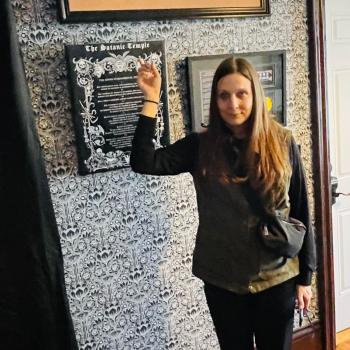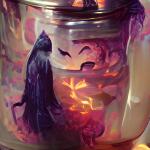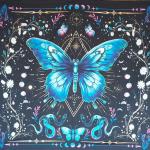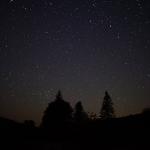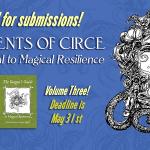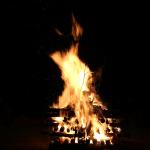Every Monday, Wednesday and Friday in December we will be asking people questions about Paganism and Pagan religions and culture. Want to weigh in? Find the next question at the bottom of this post!
Are there ever times when you doubt your spiritual path? What place and use does doubt have in your spirituality?
P. Sufenas Virius Lupus responds:
In the very best course I took as an undergraduate–a religion class my first year taught by a guest professor named N. Robert Glass, which was called “Mysticism and Ethics (Emphasis on Asian Traditions)”–I learned a great deal; but one of the statements that I most took with me occurred during my final private meeting with Prof. Glass. I had mentioned the phenomenon of doubt in several different religious instances we studied, both in the class and outside of it, and he suggested doing a study on doubt would be really interesting and useful, because “No one has a problem believing in doubt.” What a profound statement–even beyond the paradoxical seeming of it for some people of a religious viewpoint–!
Several years later, I heard about a book during another class on mysticism during my M.A. program, by Winifred Gallagher called Working on God, on the phenomenon she calls “neo-agnosticism,” which to some extent she defines as the need by some religious seekers to “see” rather than simply to “believe.” I definitely identify with this viewpoint far more than many others, and to a certain extent I still have some investment in the neo-agnostic label. I’m very wary of taking something on board religiously or spiritually simply because others say it must be so; if something is not within the realm of my own experience, I am skeptical about it, though more than willing to give others the “benefit of the doubt” when it comes to its importance or relevance in their own life.
If one’s doubt is a productive doubt, and leads to further action and a search for answers (which may or may not ultimately allay the initial doubt or doubts), I think it can be an important and indeed essential part of any spiritual journey and practice. If, however, one’s doubt leads to a lack of initiative, a loss of hope, and a lack of action or effort, it is not useful. The ways that doubt can urge one on to seek further and deeper or more intense experiences, or the ways in which it can make one self-critical–a skill often sadly lacking in overly credulous religious practitioners of all types–can be extremely useful and productive. It is sad to see the “blind faith” of so many new Pagans, who have often been in revolt from whatever (usually creedal monotheistic) religious viewpoint they’ve started out in, end up either never being questioned or questioning themselves (and thus replicating the creedalism of their previous religion), or having any critical reflection shatter whatever “faith” they feel they had, when the real issue isn’t “faith” at all, but experience. “Faith” is not the polar opposite of “doubt.” One can have elements of “doubt” within, beyond, and throughout a particular experience, but once doubts resolve, taking action becomes that much more possible and meaningful as a result.
As for me? I remember doubt playing an important role as I first discovered Paganism. When you first reach out for the religious experience in Paganism in can be a bit like feeling your way around an unfamiliar room in the dark. It takes some time to get your bearings and make out what things are. It’s an entirely new way of seeing. Doubt was critical in shaping a healthy worldview and relationship with the Gods.
Today doubt plays a different role. Although I always have some level of doubt over my path’s direction, which is to be expected of any human being, I am fairly confident and grounded when it comes to my religion. There is no doubt regarding the Gods or my worldview. This has gone beyond a religious stance I have adopted to becoming a basic part of my being. Being Pagan is no longer an idea I am testing but an integral part of myself.
Where doubt comes into play for me now is in my community, particularly the greater Pagan community. I find I am more open but also more wary nowadays when it comes to the wider Pagan community. I no longer assume people I do not have significant experience of are operating in good faith, but neither do I assume they operate in bad faith. I also am learning to take one of the sayings of my tradition to heart By Your Deeds You Will Be Known and I’m learning to doubt words until I see action to back them up. I’m also learning to doubt my own capacity until I’ve tested it. This is a bit at odds with the tentative but unclouded optimism I bore last spring. I’ve found this doubt useful, as I find how grateful I am for actions that live up to Pagan values, both my own and others, and how less stressed I am when those actions don’t match up, either to community values or stated intentions. Viewing others with a healthy level of doubt and viewing my own capabilities with more doubt, I think makes me more productive and effective, and far more grateful and appreciative of the people I work with regularly.
Perhaps it’s not the kind way to approach the community, but then, someone once told me we practice the Craft of the Wise, not the Craft of the Nice.
Last question for this series:
Why do you think Paganism has had a revival over the past 100 odd years? Is it simply due to the decriminalization of Witchcraft and divination? After 1500 years of oppression, why now?
If you’d like to weigh in just e-mail me your short response (250-500 words) before Dec 31st. It’s sfoster at patheos.com.
Do you like this interactive format? Should we start a new series for January? Let us know!



